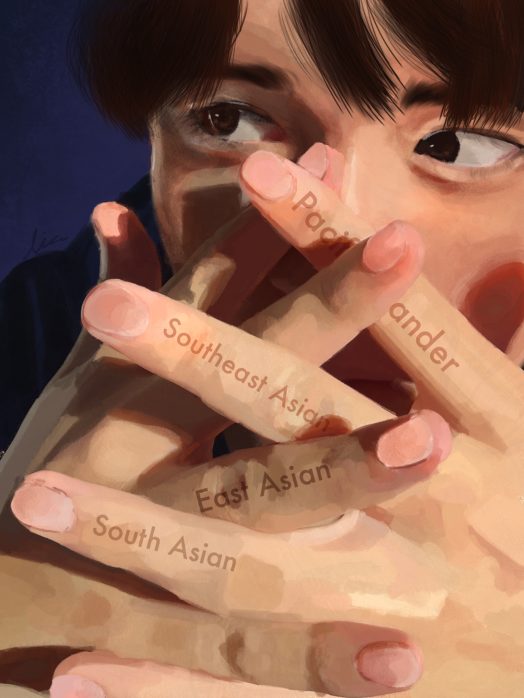Artwork by Siri Raghunayakula
In 2021, amid rising rates of hate crimes towards those with East Asian ancestry, the term “AAPI”, or Asian-American and Pacific Islander, became the focal point of an ultimately successful campaign to lobby the federal government to pass a new hate crime bill. AAPI advocacy groups, most notably “Stop AAPI Hate”, have continued to advocate at all levels of government for increased education and fair treatment.
But when you think about it, outside of a vague demographic grouping, the term “AAPI” doesn’t really have that much going for it, does it? In fact, I would argue that the term is inaccurate, too broad to be of any descriptive value, and even offensive and minimizing.
Let’s start with the fact that Asia is a gigantic continent, and an “Asian-American” can be a Yukaghir from Siberia or a Persian from Iran. India alone has hundreds of different languages and cultures. There is incredible diversity here!
On a more molecular level, it does not make sense that Pacific Islanders be lumped in with Asian-Americans. Pacific Islanders have very distinct histories, cultures, and religions when compared to many of the groups in the “Asian-American” category. China and Korea are more similar in culture and more linked in history than China and Hawai’i.
In the American context, what is supposed to unite these disparate groups is a shared history of discrimination by the US government. But even the forms of discrimination are distinct. The Philippines were colonized, the Marshall Islands were used as a nuclear testing site. The Chinese were barred from immigration in 1882. Lumping these events together inherently downplays the significance of each. Clearly, distinct problems require distinct solutions.
And that’s the crux of the issue, isn’t it? Is the solution to divide already divided groups further? Incise the AA from PI, separate Indian-Americans from Korean-Americans, separate the Telugu from the Tamil. Separate the rich from the poor, the educated from the not, the tall from the short, until we have 7-and-some-odd billion organizations; one for each person.
Stratification is not what we need right now. To get any change done requires people to come together and fight for common goals. But then why not go in the other direction? Include the whole world and we could surely find something we all agree on. All you have to do is muddy the original focus of AAPI advocacy.
One person calling their legislator won’t achieve social justice. But having a million people petitioning the US government to provide everyone clean water will do nothing to include AAPI history in textbooks.
So what is to be done? Shall we divide and allow ourselves to be conquered? Or shall we blur the focus until the core goal is unrecognizable?
No good writing leaves out answers. I believe AAPI as a census term ought to be broken into the categories of Southeast and East Asian, Pacific Islander, and South Asian to accurately reflect regions with some semblance of shared history, religion, geography, and culture. Further, AAPI month ought to be broken up into two months.
I think the focus of advocacy groups representing the rights of those whose families broadly originated from “Asia” and “The Pacific” should create separate groups within the organization to address certain issues, like how the Democratic Party, a party for any American, has a Hispanic Caucus designed to address Hispanic issues. That way a compromise may be struck.
Furthermore, perhaps AAPI advocacy organizations can join with immigrant rights groups. Many Asian-Americans are first or second-generation immigrants. Surely common-cause can be found between AAPI and immigrant groups without compromising the core values of either. AAPI organizations can even look abroad and work with organizations in Pacific countries, like Samoa and Papua New Guinea.
Ultimately, I cannot dictate the manner in which marginalized peoples fight for themselves. But I will always offer my support for individuals claiming their autonomy. While much may be reflected upon in the word “AAPI”, what matters more is that those AAPI have safe living conditions, representation, justice, and dignity.

